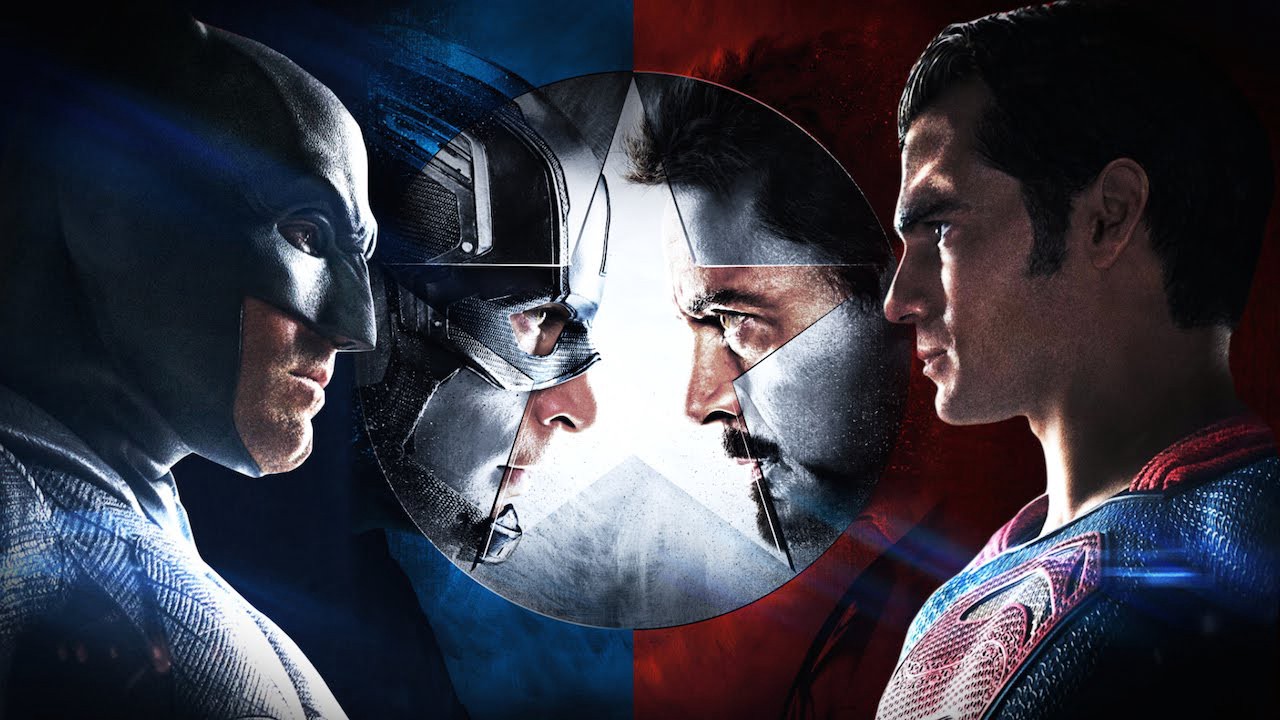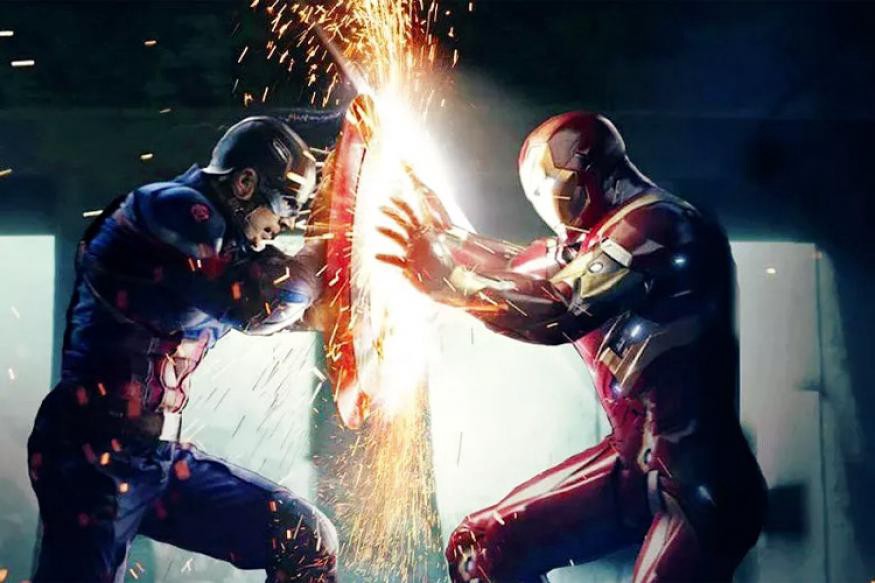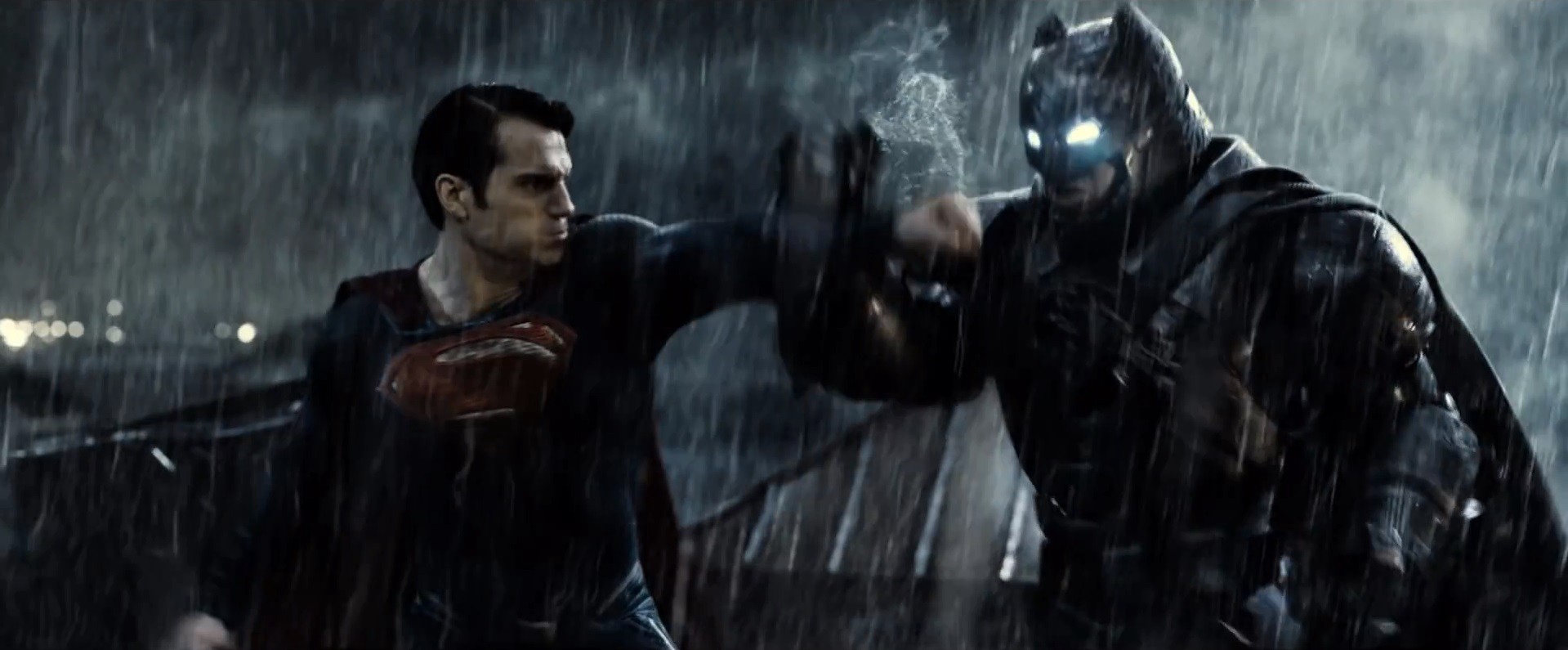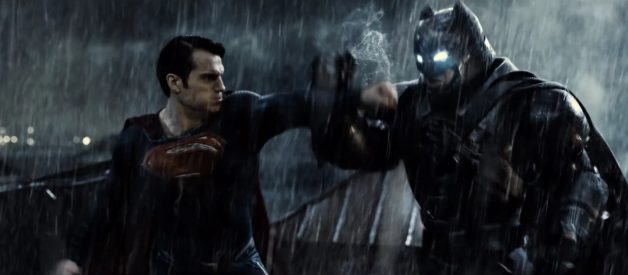 Titans from two universes square off in 2016?s two biggest Superhero blockbusters.
Titans from two universes square off in 2016?s two biggest Superhero blockbusters.
Anyone who knows me knows that when it comes to comic book superheroes, my sensibilities have always veered more strongly towards DC than Marvel. I love many Marvel characters, but i don?t carry nearly as deep an emotional connection to the world of Marvel as I do to DC. For instance, while I greatly enjoy most of the Marvel films and even hold several of them up as masterpieces, the DC films, with a few exceptions, are still my favorite. Even so, there?s no denying that Marvel has enjoyed virtually unbroken cinematic success while DC, especially as of late, has been floundering. The reasons for this vast contrast are as varied as they are debatable and not worth getting into here. Rather, I wanted to share some insights on two films from these distinct universes, two films which, despite being released the same year and grappling with many of the same themes and ideas, were received, both critically and commercially, in tremendously different ways.
The films in question are Captain America: Civil War and Batman v Superman: Dawn of Justice, both of which were released just a few months apart back in 2016. While Civil War was yet another home run for Marvel?s cinematic lineup, garnering high praise from critics and over a billion dollars at the box office, BvS was, as anyone not living in an underground bunker will tell you, almost universally hated by critics and many fans, leading to fierce debates which seem to still be raging even as I write this. Despite their differences, these two films share a similarity of themes and even use some of the same devices to not only tell their respective stories but also further their collective universes and yet both films were received so differently, a fact which speaks volumes to, among other things, the preconceived expectations we as a movie going public have come to place on comic book inspired films.
At the heart of both films lies a clash of opinions regarding the ways in which our costumed heroes should conduct themselves and how they should be dealt with when their actions, regardless of intent, cause unintended consequences in the world. At the center of this conflict in both films are the heroes themselves who end up on opposite sides of the argument and eventually come to blows. In BvS, while the world grapples with its understandable mistrust and fear in the wake of Superman?s appearance, both the Gotham Bat and the Man of Steel find themselves slowly drawn into conflict over each other?s vastly different methods and outlook on the world.
While Superman regards Batman as nothing more than a lawless thug in a cape terrorizing people and acting as sole judge, jury and executioner, Batman, traumatized by the destruction he witnessed firsthand during Superman?s battle with Zod in Metropolis, believes that the Kryptonian is nothing but an alien threat who will inevitably destroy mankind. While Batman goes about finding a way to physically hurt and possibly kill this alien threat, Superman at first uses the power of the press as Clark Kent to try and expose Batman?s reign of vigilante terror before finally confronting him cape to cape, as it were. Both men, although trying to make the world around them a better place, are at odds over the best way to go about doing that.
Unlike Superman and Batman, who are just meeting for the first time in BvS, the main heroes at the center of the conflict in Civil War, Captain America and Iron Man, have been partners for a while as members of the Avengers, despite not always seeing eye to eye on the best way to make the world a better place. When one of the newer Avengers, the telekinetic Scarlet Witch, accidentally lets an explosion go off near a building which kills several humanitarian workers inside, the UN passes the Sokovia Accords, which call for a UN Panel to oversee and control the Avengers in the hopes of avoiding future slip-ups. As news of the Accords reaches them, the Avengers become sharply divided, with the main fault line forming between Iron Man, who agrees that the team needs to be monitored, especially in the light of their past mistakes, and Cap, who?s suspicious of the Government?s possible ulterior motives and continues to trust his own instincts as well as those of his teammates. The conflict deepens when Captain America?s old wartime buddy, Bucky Barnes a.k.a. the Winter Soldier, resurfaces and is believed to have blown up the conference where the accords are to be ratified, killing many people, including the father of T?Challa a.k.a. the Black Panther. When the people behind the accords as well as those who support them, including Iron Man and Black Widow, want to bring Bucky to Justice, Cap instead gives his oldest friend the benefit of the doubt and comes to his aid, further stretching the already growing rift between Cap and Iron Man.
 Captain America and Iron Man duking it out in the finale of Civil War.
Captain America and Iron Man duking it out in the finale of Civil War.
Interestingly, both films open with an event which brings the issue of superhero supervision into sharp focus. In BvS, the scene in the desert where Superman saves Lois from an African warlord (a scene which was butchered in the theatrical cut), acts as the catalyst for Government intervention when it?s made to look like Superman burned a bunch of people to death with his heat vision. In Civil War, Scarlet Witch?s handling of the explosive during the film?s opening battle is the final straw for a Government already worried about the collateral damage and loss of life caused by the Avengers past battles. One key difference is that unlike with the Avengers (excluding Thor and Hulk), the world at the beginning of BvS has no way to stop Superman even if they wanted to; they?re completely dependent on his choice to help instead of harm them. Still, this doesn?t stop the government from implementing Senate hearings to determine what to do about the ?Superman dilemma?.
The scale of the conflicts in these two films are much different to be sure, with BvS showing two incredible individuals getting pulled into direct conflict with each other while Civil War eventually explodes into a massive conflict which forces just about every hero to pick a side and eventually duke it out. However, behind the scenes of both films lurks one scheming individual who is revealed to be the mastermind behind the conflict, the great puppet-master skillfully manipulating these titans into fighting with the hope that they?ll destroy each other. In BvS the grand puppet master is none other than Lex Luthor, the Machiavellian genius who figures he can kill two birds (well, one bat and one alien) with one stone, or rather, get them to kill each other by playing on their emotions, but not before turning the world against Superman by orchestrating the scene in the desert as well as the Capital bombing. In Civil War it?s the nefarious Helmut Zemo pulling the strings and using Hydra?s old brainwashing codes to control Bucky and turn him into the world?s most wanted man, knowing full well that Cap and Iron Man will duke it out until the bitter end, especially after Tony learns in a shocking revelation that it was Bucky who murdered his parents all those years ago.
When BvS was released a mere two months before Civil War, it was met with a firestorm of criticism, much of it aimed at both the character?s and the film?s prevailing sense of gloominess and flexibility with the whole ?no-kill? superhero rule, which for some reason is still meticulously applied to these characters even though their Marvel counterparts have no problem killing. Despite the film?s serious and gritty tone, I would argue that BvS ends up the more optimistic of the two films. In fact, the films actually run in opposite directions, with BvS and its characters starting off gloomy and ending up with renewed purpose and inspiration while Civil War begins with Marvel?s trademark lighter, jokier tone and gradually becomes quite serious and intense as friendships are shattered and characters are physically and emotionally battered and broken apart. Don?t get me wrong; the grittier tone and lack of a formulaic ending in Civil War is one of the reasons it?s one of my favorites from Marvel.
 Son of Krypton versus Bat of Gotham in BvS.
Son of Krypton versus Bat of Gotham in BvS.
On the other hand, although BvS ends with Superman?s death, his heroic sacrifice not only saved the entire world but also restored his reputation as a symbol of hope to humanity and restored Bruce?s faith in humanity as well as helped to bring Wonder Woman out of the shadows. After their mutual dark night of the soul, both men emerged from the darkness and uncertainty as the best versions of themselves and that?s what ultimately makes BvS an uplifting, inspiring film. One key difference between the two is the lack of continuous action in BvS as compared to the almost relentless action in Civil War, a fact that obviously made it the more popular of the two among people looking to watch a more straight-forward action film, as has tended to be Marvel?s style. It?s true, BvS has sizable periods where nothing happens superhero action wise, but I feel that this made the periods of action, (i.e. the Batmobile chase, the warehouse fight, Wonder Woman?s first appearance and the Trinity battle, to name a few), stand out even more brilliantly and memorably because they were used tastefully and left you wanting more instead of feeling overwhelmed and exhausted by them. BvS is more of a slow burn than a break from the gate type of film and that?s just a personal preference.
Although Wonder Woman?s appearance in BvS, her first ever big screen debut, was generally regarded as a high point even by people who disliked the film, there were no doubt some who felt that Wonder Woman (and even Batman) were shoehorned into a film that was essentially a continuation of the story begun in Man of Steel. Interestingly enough, Civil War, which is a Captain America film, feels in many ways like an Avengers film given the presence of both old and new Avengers, with the notable exception of Thor and Hulk. The film features Iron Man, Hawkeye, Vision, Scarlet Witch and relative newcomer Ant-Man as well as the first appearance of the MCU?s new Spiderman and first ever film appearance of Black Panther. Black Panther?s role in Civil War is very similar to Wonder Woman?s appearance in BvS; both served to establish the characters in their film universes before they each got their first solo origin film. Similarly, Affleck?s Batman and Tom Holland?s Spiderman serve a similar purpose, namely as a way to present new versions of incredibly familiar characters who?ve each had their origins explored too many times on film. Rather than waste time retreading familiar ground, it was wisely assumed that even the most casual fan knows enough about these two characters that they could already be established in these connected cinematic universes.
Even though I truly love Civil War, one could make the argument that the film does feel a bit overcrowded at times, although not nearly as crowded as Infinity War (which for the record, I also loved for reasons similar to Civil War). I?m sure that BvS also took some fire for the way it chose to introduce Flash, Aquaman and Cyborg by showing them in brief footage stolen from Lex?s servers. I imagine some fans felt the scenes were too brief while others felt they were just awkwardly crammed in, but to me this was the perfect way to establish that these other exceptional beings exist in this universe, simultaneously whetting our appetite to see more of them but not showing too much and taking anything away from the movie?s main players. It also made sense to me that Lex would be the first one to discover these exceptional people, including Diana, given his obsession with identifying anyone else who threatens his sense of superiority over humanity. After Superman?s arrival, Lex would naturally wonder if there are other beings like him out there, the so called ?gods among men? who form the basis for our mythology. After Bruce?s curiosity about Diana leads him down this meta-human rabbit hole, he realizes that he must find these people before Lex does, especially once Superman is no longer around to defend the world.
If people are going to complain about the future Justice League members being rushed into the universe, they at least have to admit that Civil War did the same thing in regards to Spiderman and especially Black Panther. Having said that, I will admit that compared to the way that Marvel initially established its shared universe starting back in 2008, the DCEU has felt rushed at times, but I chalk this up more to studio pressure and given that enormous pressure to deliver box office hits quickly in Marvel?s shadow, I think Zack Snyder, starting from Man of Steel up until Justice League was stolen from him, has done a phenomenal job of establishing a unique feel and tone for his universe, simultaneously re-examining and deepening the development of all too familiar characters while finding an organic and logical way to introduce new characters into a more realistic and familiar world.
At the end of the day, any real debate about these two films boils down to personal taste. No matter what I or anyone else argues, some people will always prefer the style, tone and content of a film like Civil War over the style, tone and content of BvS or, like me, they?ll enjoy both for different reasons. That?s the beauty of all of this. These films may be telling similar stories with similar themes, but the fun is in how the different characters in these stories respond to the circumstances in which they find themselves as well as how these stories are conveyed to us, the viewer. The beauty of these two films is that they?re both telling the same basic story, one in which extraordinary individuals exist in a world pretty damn familiar to ours, a messy and complex world trying to figure out the best way to deal with these ?gods among men? who in turn are trying to figure out the best way to help people without betraying who they truly are and what they believe. Despite their differences, both films took some similar risks in their quest to tell complex and interesting stories, stories which go beyond the formulaic good versus bad duality and it?s when films are willing to take risks with expectations that they can take the leap from just entertainment and become art.


